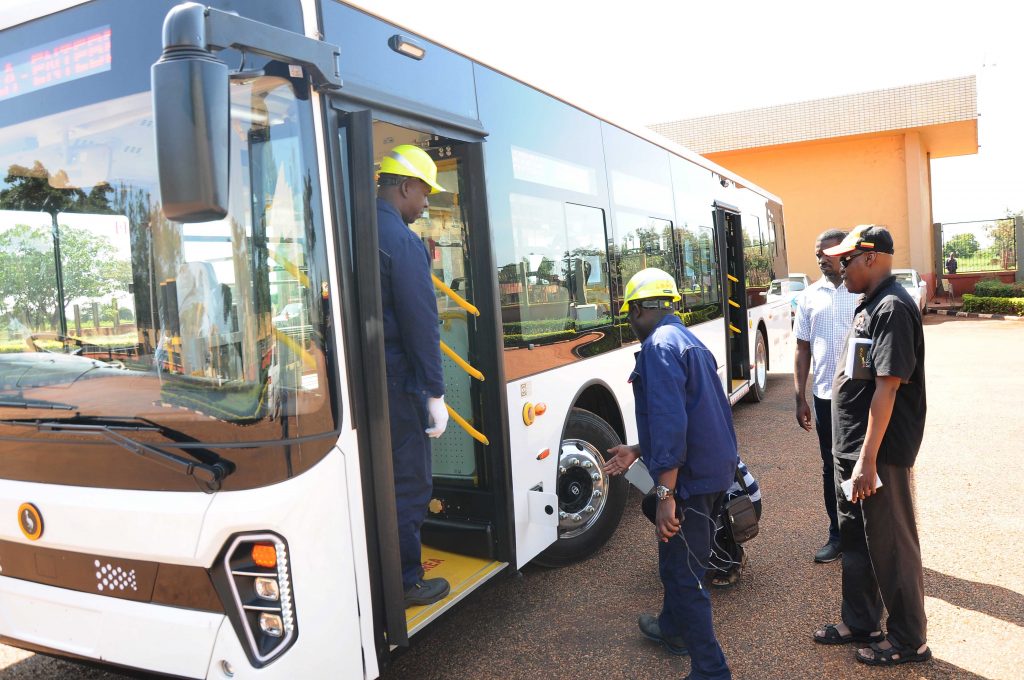Uganda’s Kiira Motors starts ramp-up to domestic bus manufacture

Uganda has entered the penultimate lap on the journey to domestic vehicle manufacturing with the start of assembly of the locally developed Kayoola Electric Bus. Engineers from Kiira Motors Corporation KMC, have since October 30 been holed up at an industrial-military complex in Nakasongola, 150 kilometres north of Kampala, where assembly of the of the second market validation vehicle, a 90 seater urban commuter bus, is currently ongoing.
The bus which came as a semi-knocked down unit, is one of two vehicles that are in the country, the first having been assembled in China with the participation of six automotive design engineers from KMC. Officials say they expect to conclude the assembly effort before the end of December.
The buses that run exclusively on electric batteries have a design range of 300 kilometres on a single charge at a maximum operating speed of 80 kilometres per hour. Once technical tests are complete, the buses will deployed for live trials with passengers on the 40km Kampala-Entebbe route.
Two level 3 charging stations which can recharge the batteries in under two hours have also completed calibration at Nakasongola and will be transferred to Kampala and Entebbe.
Kiira Motors Chief Executive Officer Isaac Paul Musasizi says the data collected during the trial runs of the Two Electric buses in Kampala, shall feed into the development of a business model for rolling out electric buses along other routes and other urban centres.
“Kiira Motors Corporation is exploring piloting green mobility technology for mass mobility. This pilot project is aimed at validation of key target market requirements; concretization of the manufacturing process and kitting strategy for the Kiira Vehicle Plant; validation of the logistics strategy; and development the KMC team core competences in bus CKD (completely-knocked-down) assembly operations,” he says.
The first was shipped as a Fully Built Unit while the second bus came in Semi-Knocked-Down kits. The vehicle that is currently under assembly is the second of two units that will lead the validation effort. Its components were supplied by KMC’s technology transfer partner, CHTC Motors of China.
Musasizi explains that they chose Luwero Industries as the site for interim assembly because it was one of a few places in Uganda where they could have access to the power infrastructure that can supply the 200KW needed to operate the charging station. He adds that besides the basic tools such as metal presses, the 49 square kilometres of land on which the military base sits provides ideal conditions for testing the vehicles under all possible road conditions without interfering with public roads.
Another two electric buses will be assembled in the coming months although unlike the first one, the metal frame and sheets for these will be sourced and cut to shape locally. A further two Euro 5 buses that have been designed for the long-distance cross-border market will also be built although these will be powered by diesel engines.
Mr. Richard Madanda, KMC’s director for product development says the first vehicle was built in China purely for reasons of technology transfer. “Otherwise we own a big chunk of the intellectual property in this vehicle and its systems integration,” he told 256BN.
Construction of the final assembly plant is ongoing in Jinja 80kilometres east of Kampala. Assembly will transition to Jinja when full series production starts in mid-2021.
According to Allan Muhumuza, the business development manager at KMC, building the third bus using locally available materials will be used to validate the domestic supply chain that is expected to progressively raise the level of local content in the vehicles. Material such as steel and plastic that are used extensively in the body works are locally available.
“All they need are the moulds to press these parts, so we shall use the process of sourcing materials for the third bus to accredit local suppliers,” Muhumuza says.
According to the production timelines, local entities will begin by supplying basic parts for the structure such as the chassis and frame and bolts and nuts by 2021. Electric components such as the motors and lithium ion batteries will be locally produced by 2028 with local battery maker Uganda Batteries already primed for the role.

 African Heads of state head to South Korea next week for Summit talks
African Heads of state head to South Korea next week for Summit talks
 Trading leads as main source of income for Ugandans
Trading leads as main source of income for Ugandans
 New leadership for bankers’ umbrella as total assets top $12 billion
New leadership for bankers’ umbrella as total assets top $12 billion
 Brussels Airlines to announce Nairobi service
Brussels Airlines to announce Nairobi service
 SITA promises enhanced travel experience after Materna acquisition
SITA promises enhanced travel experience after Materna acquisition
 Saudia’s 105 aircraft order stretches A320neo lead over rival Max
Saudia’s 105 aircraft order stretches A320neo lead over rival Max
